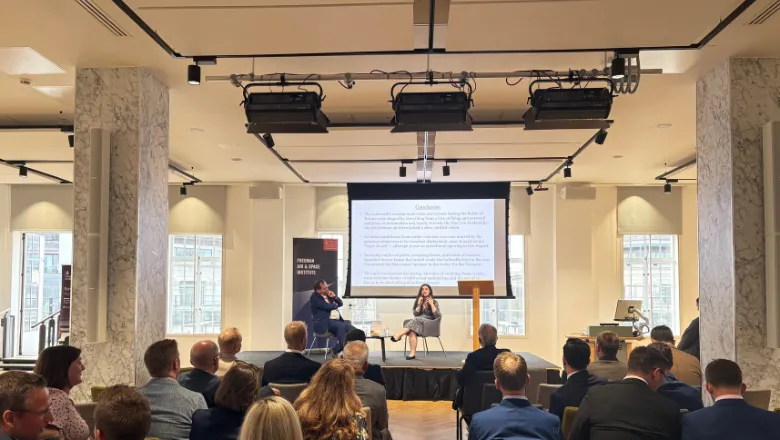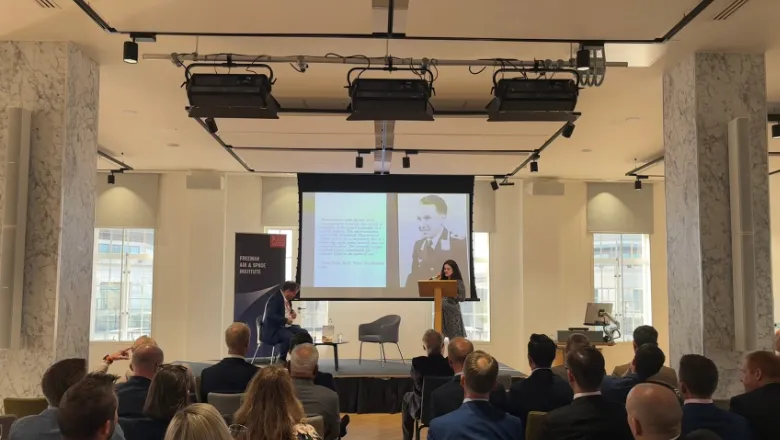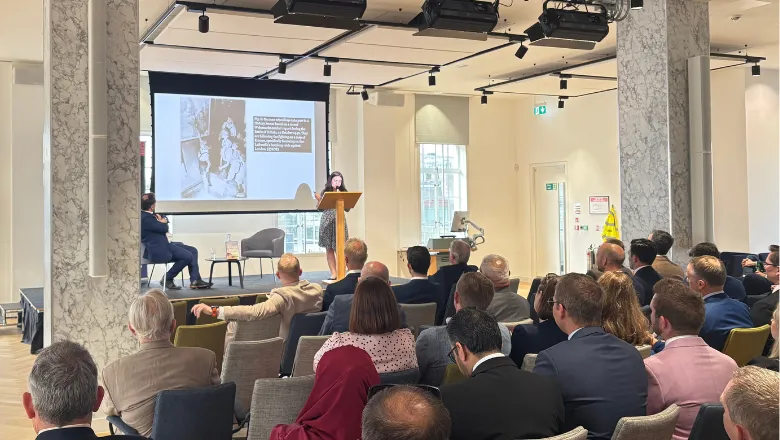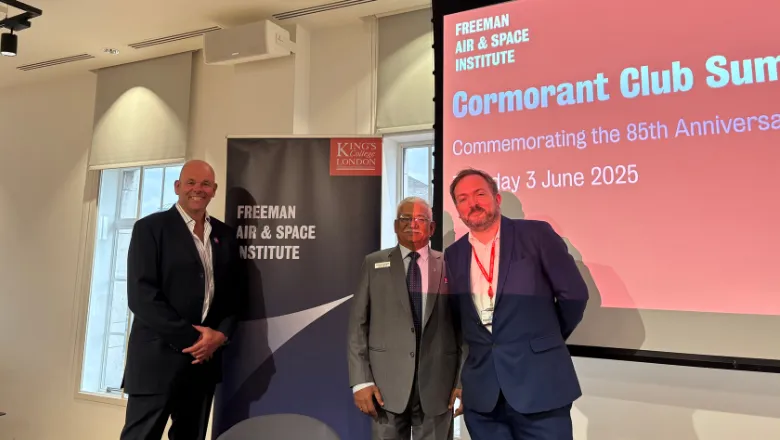What was the Battle of Britain? Ultimately, it’s a matter of life and death - that is not just the case for Britain but also for Europe as a whole in 1940. It’s one of the most famous air campaigns in British history and is often described as the Royal Air Force’s finest hour
Dr Victoria Taylor
19 June 2025
The Cormorant Club commemorates 85th anniversary of The Battle of Britain
On Tuesday 3 June, Cormorant Club members gathered to celebrate their annual summer reunion. This year’s event theme commemorated the 85th anniversary of The Battle of Britain, with a keynote presentation from guest speaker Dr Victoria Taylor, an award-winning aviation historian.

The Cormorant Club is the alumni association of the Joint Services Command and Staff College (JSCSC) in Shrivenham. The association is open to graduates of the Higher Command and Staff Course (HCSC) and the Advanced Command and Staff Course (ACSC), which are delivered in partnership with King’s Defence Studies Department to provide professional education for military personnel and civil servants. This year’s event was organised in collaboration with the School of Security Studies’ Freeman Air and Space Institute.
Dr Victoria Taylor specialises in the Royal Air Force and the Luftwaffe. She previously taught as part of KCL's Defence Studies Department at the JSCSC, Shrivenham, and is an Associate of the Freeman Air and Space Institute.
Her lecture, titled, ‘Eagle Days: Life and Death for the Luftwaffe in the Battle of Britain,’ focused on the military, political, social and cultural influences that shaped the German air force's mentality and morale during the Battle of Britain.
Dr Taylor began by highlighting just how pivotal the Battle of Britain was, signalling it as a crucial turning point for the Allied victory of World War Two.
Dr Taylor detailed the research on the battle through blending a diverse range of primary sources together (Luftwaffe air crews' personal letters and diaries), with official combat reports, and contemporary German newspapers.
She shed light on the distinct differences between how the Battle of Britain was perceived by the UK and the Luftwaffe. The UK perceived the campaign as starting on 10 July 1940 with the Kanalkampf (Channel Battle.) This was followed up by the Adlerangriff (Eagle Attack) on 13 August 1940. The onset of the Blitz was 7 September 1940, with the Battle of Britain itself ending with the final daylight raid on 31 October 1940.
The Luftwaffe perspective instead recorded both the Battle of Britain and the Blitz together, rather than as individual campaigns.
‘I think that's an incredibly important aspect to look at in terms of morale because we suddenly see how daunting and ultimately how disappointing this campaign was for the Luftwaffe’
Dr Victoria Taylor
Expanding on the various stages of the campaign, Dr Taylor explained ‘Phase 1’ – Kanalkampf’ – where the focus for the Luftwaffe was on the allied shipping and convoys. The battle then moved into a series of other phases including ‘Phase 2’ - Heightened German and British fighter clashes (24 July – 8 August)’, ‘Phase 3: Adlerangriff ‘(‘Eagle Attack’) which was conducted by widespread fighter and bomber formations against the RAF’s air fields and industry (8 August – 6 September), ‘Phase 4: the opening of the Blitz’, which saw a mix of daylight and nighttime Luftwaffe raids mainly concentrated on London (7 September – 20 October) and ‘Phase 5: the ‘Night Blitz’ offensive, conducted independently by German bombers from the end of October 1940 until May 1941.

Dr Taylor described the Luftwaffe’s combat motivations, including the experience and morale of the force. Crucial to its identify and spirit, she suggests, was a combination of conscription and its presentation to the German population as a cutting edge and modern cause. She cited the opinion of Max Mayer, a Luftwaffe Test Pilot, who described the forces facility as ‘beautifully done and deeply Luftwaffe’ - a sleek nature that lent it huge appeal to Germans and Austrians in this era.
In her remarks, Victoria noted just how the Luftwaffe’s combat motivation and morale during the Battle of Britain were shaped by everything from a love of flying and personal ambition, to nationalism and loyalty towards the Nazi war leadership and political gain. She added that the ultimate failure came due to the German air force’s lack of a clear and unified vision, followed by a declining calibre of pilots, mounting losses, and a lack of reserves which signalled deeper issues that would strain the Luftwaffe later in the war.
‘There's a desire to fly, there's a fascination of technology, there's a sense of national pride, a faith in Hitler, and a sense of retribution against the British.’
Dr Victoria Taylor
Victoria concluded with the lessons learned from the Battle of Britain, emphasising the evolution of the Luftwaffe's historical role during the RAF's 'Finest Hour' from antagonist to a multidimensional, flawed-yet-formidable opponent.
In his closing remarks, Dr David Jordan, Co-Director of the Freeman Air and Space Institute and Senior Lecturer in Defence Studies highlighted the importance of Dr Taylor’s work, adding ‘Victoria's research is a vital example in terms of understanding your adversary and their operations. Knowing how they get things right and where they get them wrong is arguably the most important factor within any conflict.’

The evening also welcomed Air Commodore Ashit Mehta, a student from the ACSC -1 course (1997-98), the very first course offered at the Joint Services Command and Staff College. Travelling from India to attend the reception, the Commodore spoke on his career history, noting how significantly the course benefitted his career potential. ‘Having done my course 27 years ago, the knowledge and expertise gained supported me in good stead for my career and service’.
Commenting on the event as a whole, he added, ‘This is a perspective which we need to understand. Dr Taylor’s presentation was outstanding, highlighting just how the Battle of Britain was fought and ultimately won by the Allies.’

Dr Victoria Taylor’s publication ‘Eagle Days: Life and Death for the Luftwaffe in the Battle of Britain’ is available for purchase at all major bookstores.
The Cormorant Club is open to graduates of the Higher Command and Staff Course (HCSC) and the Advanced Command and Staff Course (ACSC).
To stay updated on the latest research, opportunities and events from FASI, subscribe to their mailing list or contact the team at FASI@kcl.ac.uk.

